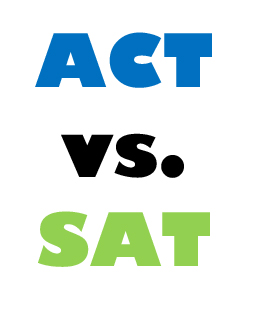Updated on August 14, 2018
ACT vs. SAT: Questions to Ask Yourself
Once upon a time, certain colleges preferred certain tests. That’s no longer the case! Virtually any college that accepts the SAT also accepts the ACT, and vice versa. While this is freeing in a lot of ways, it can also present a conundrum for students who don’t know which test to take. Here are some questions to help guide your decision-making so that you can take the test that presents you in the best possible light!
Am I a science person?
 The ACT has a science exam. Before you dismiss this and move on to the next question, consider “science” from the ACT’s point of view. Not all students will have taken exactly the same science curriculum. Thus, the science section can only really test scientific reasoning and a few (very few) facts. You can succeed on ACT science if you can think like the test, and the only way to know if you can is to try it out. I’m living proof that you can succeed on ACT science without being a scientist. (You don’t want me to be your surgeon. Trust me on this —and my high school biology teacher.)
The ACT has a science exam. Before you dismiss this and move on to the next question, consider “science” from the ACT’s point of view. Not all students will have taken exactly the same science curriculum. Thus, the science section can only really test scientific reasoning and a few (very few) facts. You can succeed on ACT science if you can think like the test, and the only way to know if you can is to try it out. I’m living proof that you can succeed on ACT science without being a scientist. (You don’t want me to be your surgeon. Trust me on this —and my high school biology teacher.)
Would I rather answer slightly easier questions faster or slightly harder questions slower?
This may sound like six of one, half a dozen of the other…but actually, most of us have a preference. The best way to figure this out is to take a practice exam under timed conditions for each test. The ACT provides less time per question, generally (50 seconds vs. 1:10 for the SAT)—but also is ever so slightly easier in terms of reading level and question complexity/trickiness. On the other hand, the SAT provides slightly more time per question, generally, but also can throw in some curveballs that can be anxiety-provoking for some test-takers.
Would I rather read shorter, harder passages or longer, easier passages?
SAT passages tend to be slightly shorter, but grade-level ranges from 9th grade up to early college. There are also more of them (5 vs. 4). ACT passages are longer, but grade-level ranges from around 10th-grade only up to about 11th-grade level.
How much do I like graphs?
Or rather, how good are you with them? The SAT was revised in 2016 to put more of a graphic emphasis on the reading section. If you’re not a visual learner, this may be more challenging. On the other hand, this is countered on the ACT by the science section, so practice tests will help you decide!
How comfortable am I without my calculator?
Calculators are allowed for ACT math. However, the questions come at you quicker, so mental math is a major plus. There is no calculator allowed on some of the SAT math, but you can use it for other problems. Again, try this out on practice tests… (okay, I’ve said my peace!).
How much do I rely on the multiple-choice format?
20% of SAT math problems are grid-ins, meaning that you have to provide the answer. If your math score is extra-important (you’re interested in pursuing a math-heavy program or math is your weaker area), this may be a factor in your decision about which test to take.
Would I rather analyze or debate? Am I better at analysis or debate?
Many schools require the writing portion of the SAT or the ACT: the essay. On the SAT, you’ll do more analyzing. On the ACT, you’ll work more with opinions.
At the end of the day, isn’t this all moot? Shouldn’t I take both tests?
No. Almost nobody should do this. You know how scientists have recently found that multitasking isn’t really a thing, it’s just switching back and forth between two things, doing them both kind of badly? That. It’s far better to take the test that comes more naturally to you, twice if necessary. Study for it, prep your best, take it—and if you don’t get the score you want, take it again. Work on your weaker areas in the meantime. Work on test strategy. The way to become a great athlete is not to train as a runner for a month and then train as a swimmer for a month (granted, it would get you into great shape, but that’s beside the point). Figure out where your strengths are and focus on them.
Rachel Kapelke-Dale blogs about test prep and admissions for Magoosh. She has a BA from Brown University, and did her graduate work at the Université de Paris VII (Master Recherche) and University College London (PhD). She has taught and written about test preparation and admissions practices for more than a decade.
For more information on applying to Notre Dame de Namur University (NDNU), please visit the admissions page.
